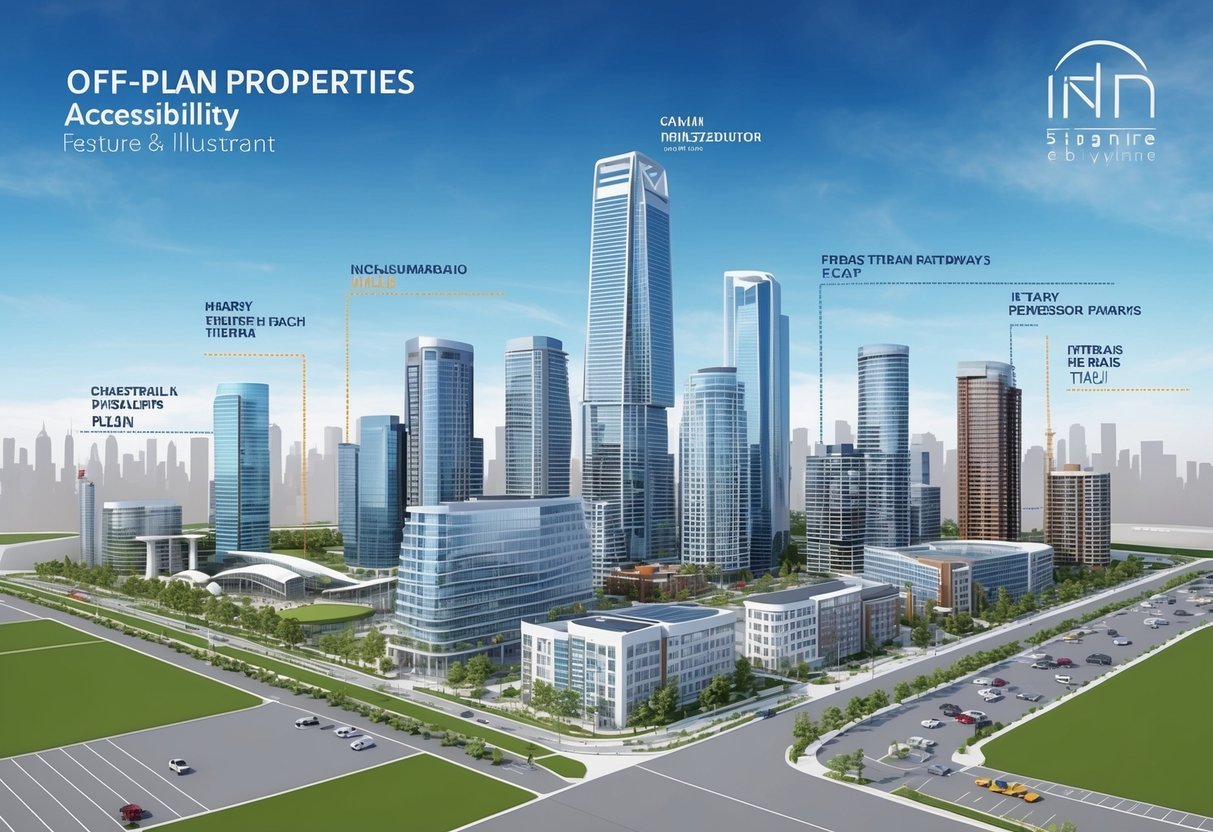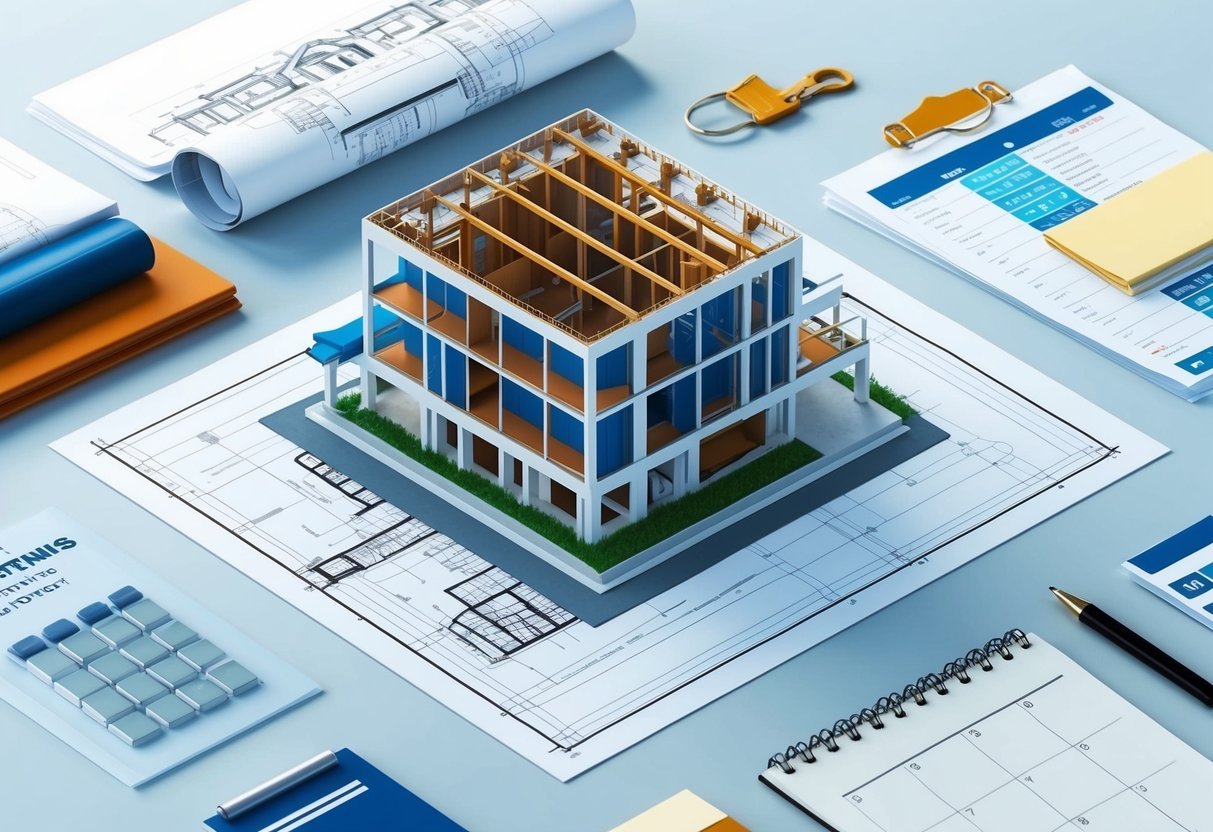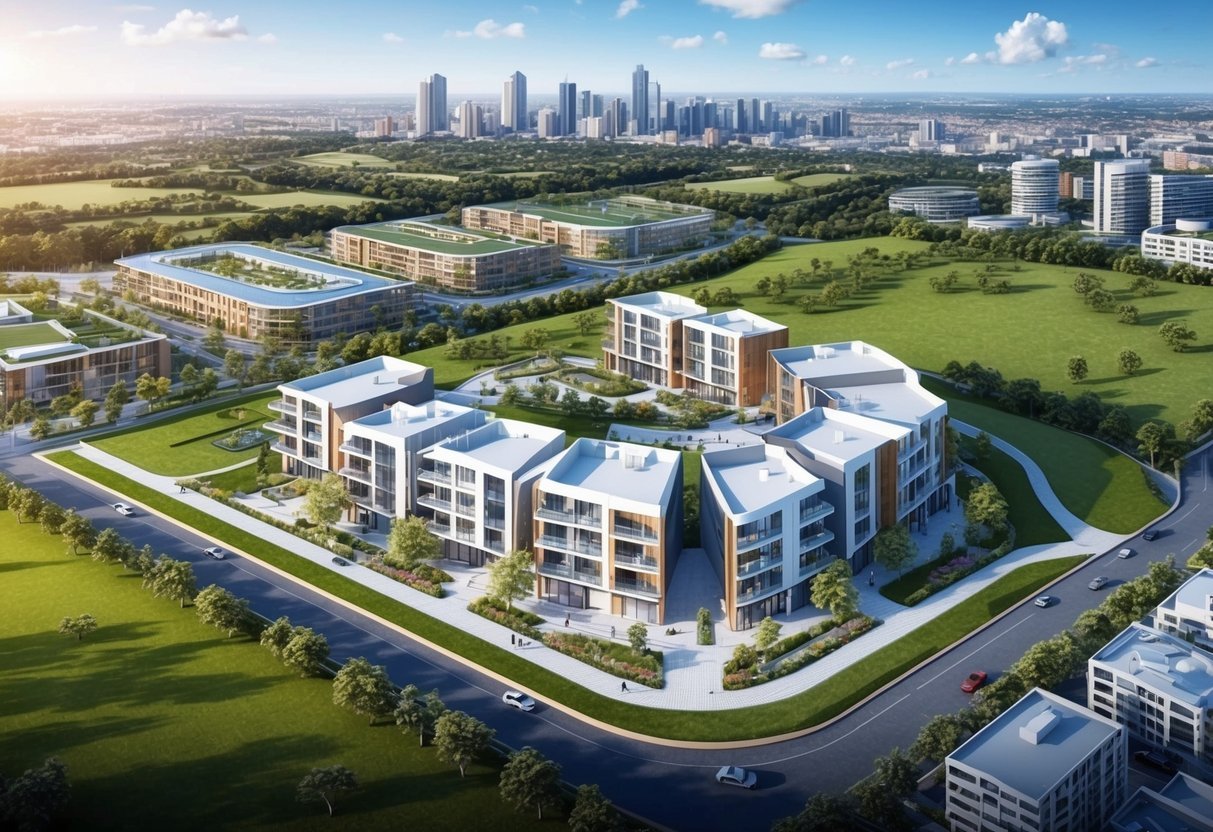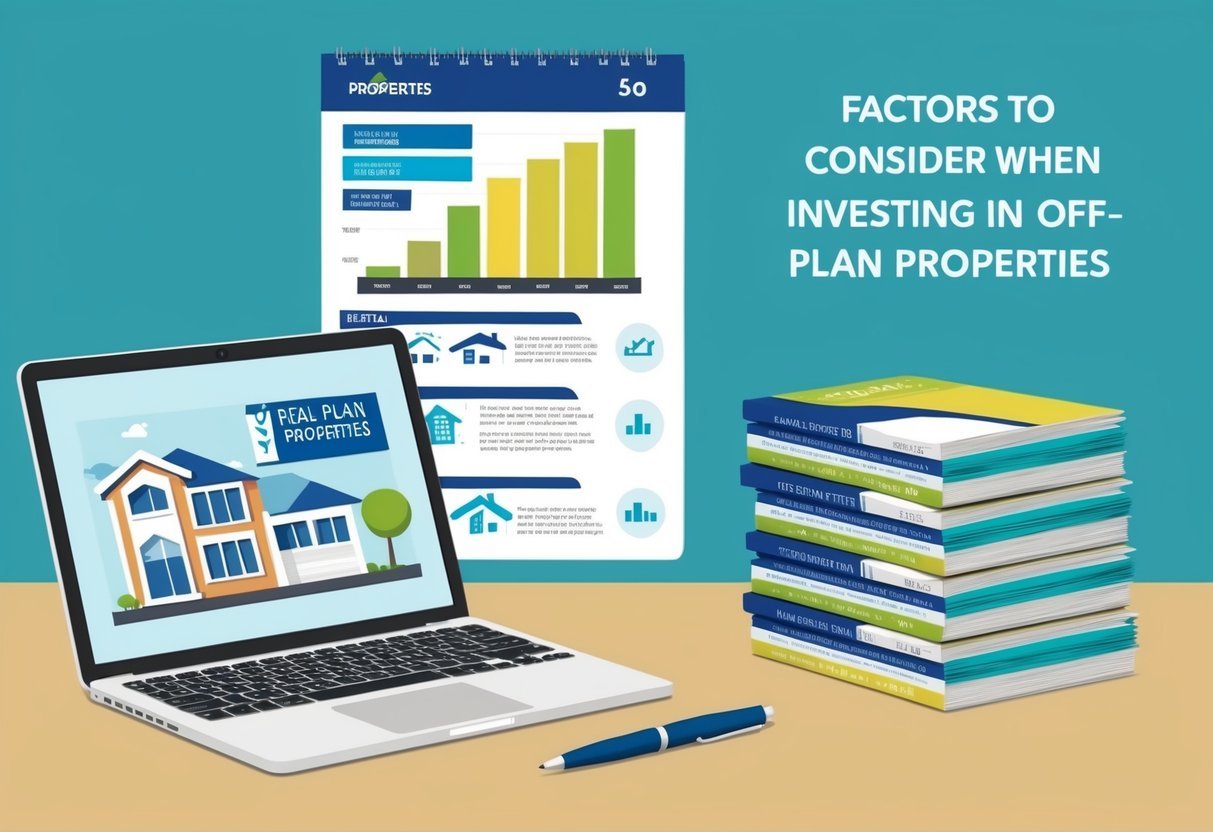Investing in off-plan properties presents a unique opportunity to secure real estate at potentially advantageous prices before construction is complete.
As we navigate this realm of property investment, we must assess several key factors that can influence the success of our venture. Understanding these elements allows us to make informed decisions and maximize potential returns.

Off-plan investments can offer significant benefits, including price appreciation, choice of locations, and a chance to capitalize on market trends.
By considering the critical aspects of this investment strategy, we can better position ourselves to reap long-term advantages while minimizing potential risks.
1) Developer Reputation

When considering an off-plan property investment, the reputation of the developer plays a vital role.
We must research their track record to ensure they have consistently delivered past projects on time and to a high standard.
Delays or substandard work can lead to complications, so selecting a developer with a solid history is essential.
Our due diligence should include investigating any feedback from previous buyers.
This involves assessing online reviews, testimonials, and industry awards received by the developer.
A reliable developer is more likely to possess a strong standing within the sector, reflecting their commitment to quality and reliability.
Checking the financial stability of a developer is also crucial.
A developer with financial challenges might experience difficulties in completing a project, leading to potential losses for us.
We should review their business history and consult any available financial statements or reports to assess their stability.
Finally, it is beneficial to visit completed developments.
This allows us to directly observe the quality of the finished work.
By understanding a developer’s reputation through comprehensive research, we enhance our chances of making a sound investment decision.
2) Location and Accessibility

When considering off-plan properties, location plays a crucial role in determining the investment’s potential.
We should focus on areas with strong economic growth and infrastructure development.
This ensures that the property remains attractive to potential buyers or renters, enhancing its resale and rental potential.
Accessibility is another factor we must prioritize.
Properties near public transportation, major roads, and essential services appeal to a wider audience.
Easy access to schools, healthcare facilities, and shopping centers makes a location more desirable and can increase the potential return on investment.
We can’t overlook future development plans in the vicinity.
Planned infrastructure projects such as new transportation lines or commercial hubs can boost the appeal of a region significantly.
By staying informed about upcoming developments, we can make more informed decisions and capitalize on future value increases.
Safety and neighborhood reputation are also critical factors.
We should research crime rates and community reviews to ensure the area is not only safe but also has a positive image.
This can impact both demand and pricing in the future.
Green spaces and recreational facilities add value to a location.
Proximity to parks, walking trails, and leisure centers enhances quality of life, which can be a decisive factor for families.
This makes a property more attractive, particularly in urban environments where such amenities are less common.
Finally, we need to consider the demographic trends in the area.
An understanding of population growth, age distribution, and employment opportunities helps us to predict demand patterns.
This information aids in aligning our investment with the preferences and needs of the community.
3) Payment Plans
When considering an investment in off-plan properties, we must pay close attention to the available payment plans.
These plans are often structured to spread costs over the construction period, which can reduce the initial financial burden.
It’s important for us to analyze these payment structures carefully.
Some developers offer staged payments tied to the completion of specific construction milestones.
This means we can budget more effectively while monitoring the progress of the project.
We should consider the flexibility of payment terms.
Certain plans might offer more relaxed schedules, allowing us to align payments with our cash flow.
This is particularly helpful if the construction timeline extends longer than expected.
Assessing the potential risks is crucial when we discuss payment plans.
Construction delays can happen, and these could affect our financial commitments.
It’s wise to ensure contracts have clauses that protect us from unreasonable delays.
Finally, let’s not forget to compare payment plans across different developers.
Each developer might have unique terms and incentives.
By evaluating these carefully, we stand a better chance of securing a plan that meets our financial goals and expectations.
4) Construction Timeline

When considering an off-plan property investment, evaluating the construction timeline is crucial for managing expectations and financial planning.
Delays in construction are not uncommon, and we must factor in potential setbacks.
Clear communication with the developer can help us stay informed about any anticipated changes to the timeline.
Understanding the estimated start and completion dates allows us to plan our finances accordingly.
We need to ensure that the timeline aligns with our investment goals and be prepared for any shifts that could impact our strategy.
Assessing the developer’s track record in meeting deadlines is beneficial in predicting potential delays.
It is also important to consider the influence of external factors on the timeline.
Weather conditions, regulatory approvals, and supply chain disruptions can all play a role in altering schedules.
Being aware of these elements helps us prepare for possible extensions and ensures that we have contingency plans in place.
Staying engaged and proactive during the construction phase allows us to address issues as they arise.
Regular updates from the developer and site visits, if possible, can provide insights into the progress and adherence to the planned timeline.
This proactive approach minimizes surprises and helps us hold the developer accountable.
Collaborating with real estate professionals can offer additional support and guidance throughout this process.
They can provide expertise and advice, helping us navigate any challenges that arise.
Having a network of professionals ensures that we remain well-informed and make decisions that align with our investment strategy.
5) Legal Considerations
When investing in off-plan properties, legal aspects play an essential role.
It’s important for us to thoroughly review all contractual documents.
Contracts should clearly outline terms regarding construction timelines, project specifications, and penalties for delays.
Understanding our rights and obligations within these contracts is key.
We should seek legal advice to clarify any ambiguous terms.
It helps to have legal professionals with real estate experience review our contracts to ensure they’re fair and comprehensive.
Due diligence in verifying the developer’s credentials and legal standing is another crucial step.
We must confirm that the developer holds proper licenses and has all necessary approvals for the construction project.
This helps mitigate the risk of project cancellations or legal disputes.
Moreover, ensuring our investment is protected by insurance is vital.
We should verify that the developer has adequate insurance coverage for unforeseen events.
This adds a layer of security to our investment.
It’s also important for us to be aware of local laws and regulations affecting property investments.
Laws can vary significantly between regions, so understanding zonal regulations, tax implications, and other legal requirements is necessary to avoid future complications.
Adding focus to the cancellation policies in the contract can protect us if project issues arise.
Knowing our options in these scenarios, including refund rights and any associated fees, is of utmost importance.
6) Potential ROI

When we evaluate the potential return on investment (ROI) in off-plan properties, several factors come into play.
It’s crucial to assess these elements early to ensure we make informed decisions.
One of the main advantages is the possibility of purchasing at a lower price compared to completed properties.
Early investments often offer us early bird discounts, increasing the likelihood of a higher return.
Additionally, market growth plays a role in ROI potential.
If we anticipate a rise in property values in a specific location, investing off-plan allows us to capitalize on future demand.
It’s essential for us to thoroughly research market trends and potential future developments in the area.
Yet, investing off-plan also involves risks, such as construction delays or market fluctuations.
These can impact our expected returns.
Keeping abreast of the developer’s reputation and project progress is vital to minimize these risks.
It might also be beneficial to consider the resale potential.
A sought-after location or unique project can attract buyers later at a premium, boosting our ROI.
Examining local demand and historical sales can guide us in forecasting likely outcomes.
We should also focus on rental yield if we plan to lease the property post-completion.
Understanding the area’s rental market helps us set realistic expectations of rental income, thereby affecting our ROI evaluation.
Each of these factors should be thoughtfully considered to estimate potential returns accurately.
Understanding Off-Plan Properties

When investing in off-plan properties, it is crucial to grasp their characteristics and the potential benefits and risks involved.
Our focus will be on providing a succinct analysis to assist in evaluating these unique investment opportunities.
Definition and Overview
Off-plan properties refer to real estate assets purchased before their construction is complete.
These can include residential units, office spaces, or retail environments.
Buyers often engage with these investments based on detailed plans and builder promise rather than the finished structure.
The appeal of off-plan investments lies in their promise of modern amenities and customizable options.
By investing early, we might secure properties at a reduced price compared to market rates at completion.
Notably, such investments are popular in rapidly developing urban regions where new projects are continually emerging.
Risks exist, including reliance on the developer’s reputation and potential unexpected changes in property value.
Buyers generally must trust that the project will be completed on time and as advertised, which emphasizes the need for due diligence.
Thorough research into the developer’s credentials and project history can mitigate some uncertainties.
Benefits and Risks
Off-plan properties offer several benefits.
Firstly, purchasing at lower prices with potential early bird discounts can mean significant cost savings.
Additionally, investors may see appreciation in property value from the point of purchase to completion, potentially enhancing returns.
Risks are a fundamental consideration.
Delays in construction are a common concern and can postpone income generation or occupancy.
Furthermore, projects may face design changes, potentially affecting the property’s appeal or value.
The lack of liquidity means selling the asset can be complex and often tied to specific completion phases.
Understanding these intricacies equips us with better insights into whether off-plan properties align with our investment goals.
Balancing expected gains with potential challenges is essential for informed decision-making.
Key Considerations When Investing in Off-Plan Properties

Investing in off-plan properties requires a careful evaluation of various factors to ensure a profitable and secure investment.
It’s crucial to focus on the developer’s track record, the property’s location, and current price trends to make informed decisions.
Developer Reputation
Evaluating the reputation of the developer is a vital step when investing in off-plan properties.
A developer with a strong track record often signals reliability and quality assurance.
We should research their past projects to identify consistent delivery of projects on time and on budget.
It’s beneficial to seek feedback from previous buyers and review any awards or recognitions the developer might have received.
A reputable developer will usually have fewer risks associated with delays or subpar construction quality.
Therefore, assessing the developer’s experience and financial stability is critical to minimizing potential drawbacks.
Location Analysis
Location plays a pivotal role in the success of an off-plan investment.
Proximity to essential amenities like schools, hospitals, and public transport can significantly influence property value.
We must analyze the infrastructure development in the area and upcoming projects that may enhance the location’s desirability.
Factors such as neighborhood safety, community reputation, and environmental features should be assessed to ensure long-term appeal.
Additionally, understanding zoning regulations and future development plans can offer insights into potential growth and resale value.
Selecting a well-situated property can maximize financial returns and client satisfaction.
Price Trends and Market Conditions
Staying informed about price trends and market conditions is essential for making sound investment choices.
Understanding how property prices have fluctuated in the past can provide context for future predictions.
We should analyze recent sales data, economic indicators, and housing demands to identify whether current pricing aligns with market realities.
Considering interest rates and broader economic influences will help us ascertain the best timing for purchase.
Moreover, examining supply and demand dynamics can highlight opportunities for capital growth.
By keeping a close watch on these trends, we can optimize investment outcomes and minimize financial risks.
Frequently Asked Questions

When investing in off-plan properties, it’s crucial to weigh the risks and benefits carefully.
Evaluating the developer’s reputation, financial considerations, potential market changes, and legal protections are key factors that can influence the success of such investments.
What are the primary risks associated with off-plan property investments?
Off-plan property investments come with risks such as construction delays, fluctuations in market value, and changes in buyer circumstances.
Ensuring comprehensive research and awareness of these risks can aid in making informed decisions.
How does the reputation of the developer influence off-plan property investment decisions?
A developer’s reputation plays a significant role in our investment decisions.
A strong track record of delivering quality projects on time can provide us with confidence and reduce potential uncertainties in the investment process.
What are the financial implications and considerations when investing in off-plan properties?
Financial considerations include evaluating payment plans, understanding potential returns, and preparing for additional costs.
Assessing whether we can meet these financial requirements is essential to avoid encountering difficulties later.
How do market fluctuations impact off-plan property investments?
Market fluctuations can affect the value of properties upon completion, influencing our potential returns.
Staying informed about economic trends and housing market forecasts helps us anticipate and mitigate these effects.
What legal safeguards should be in place when investing in off-plan properties?
Legal safeguards are crucial in off-plan investments.
Ensuring clear contract terms, understanding refund policies, and verifying permits protect our interests and minimize legal complications throughout the process.
How do completion timelines and potential delays affect off-plan property investments?
Completion timelines are a critical factor in off-plan investments.
Delays can lead to financial strain and altered plans.
Understanding the developer’s track record and preparing for possible extensions helps manage our expectations.

